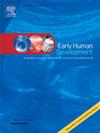Effect of maternal depression and anxiety scores on the development of three-month-old babies through the assessment of general movements
IF 2
3区 医学
Q2 OBSTETRICS & GYNECOLOGY
引用次数: 0
Abstract
Background
Depression and anxiety symptoms are common during pregnancy, which poses significant risks not only for mothers but also babies. Exposure of the fetus to maternal distress during pregnancy can lead to impairments of the newborn's development that persist throughout their lives. The objective of this study is to investigate whether prenatal exposure to maternal depression and anxiety symptoms has an impact on the neurological status of infants by assessing the quality of general movements at 3 months of age.
Methods
In this study, 101 uncomplicated pregnant patients who completed 36 weeks of gestation and their healthy newborns were analyzed. The Beck Depression Inventory (BDI) and the State-Trait Anxiety Inventory-Trait (STAI-T) questionnaires were used to assess mothers' distress. 3 months after the birth, general movements (GMs) assessments were conducted using video recordings of their babies. The scores of the questionnaires were compared between the infants grouped as “normal GMs” and “abnormal GMs”.
Results
Twenty-six infants exhibited abnormal GMs, while 75 exhibited normal. There was a statistically significant difference in maternal BDI and STAI-T scores between infants exhibiting abnormal and normal GMs.
Conclusion
Our study revealed that a mother's higher anxiety and depression scores during the latter stages of pregnancy might negatively affect the early development of the newborn and this can be determined at 3 months of age by evaluating the quality of GMs. This highlights the importance of monitoring the distress experienced by the mother and the quality of GMs exhibited by newborns and taking preventative measures.
通过一般动作评估母亲抑郁和焦虑评分对3月龄婴儿发育的影响
抑郁和焦虑症状在怀孕期间很常见,这不仅对母亲而且对婴儿都构成了重大风险。胎儿在怀孕期间暴露于母亲的痛苦会导致新生儿的发育损害,这种损害会持续一生。本研究的目的是通过评估3月龄婴儿的一般运动质量,探讨产前暴露于母亲抑郁和焦虑症状是否对婴儿的神经系统状态有影响。方法对101例妊娠满36周的无并发症孕妇及其健康新生儿进行分析。采用贝克抑郁量表(BDI)和状态-特质焦虑量表-特质量表(STAI-T)评估母亲的焦虑程度。出生3个月后,通过录像对婴儿进行一般运动(GMs)评估。将“正常gm”组和“异常gm”组婴儿的问卷得分进行比较。结果GMs异常26例,正常75例。GMs异常和正常婴儿的母体BDI和STAI-T评分差异有统计学意义。结论母亲在妊娠后期较高的焦虑和抑郁评分可能会对新生儿的早期发育产生负面影响,这可以在3个月大时通过评估GMs的质量来确定。这突出了监测母亲所经历的痛苦和新生儿所表现出的转基因质量并采取预防措施的重要性。
本文章由计算机程序翻译,如有差异,请以英文原文为准。
求助全文
约1分钟内获得全文
求助全文
来源期刊

Early human development
医学-妇产科学
CiteScore
4.40
自引率
4.00%
发文量
100
审稿时长
46 days
期刊介绍:
Established as an authoritative, highly cited voice on early human development, Early Human Development provides a unique opportunity for researchers and clinicians to bridge the communication gap between disciplines. Creating a forum for the productive exchange of ideas concerning early human growth and development, the journal publishes original research and clinical papers with particular emphasis on the continuum between fetal life and the perinatal period; aspects of postnatal growth influenced by early events; and the safeguarding of the quality of human survival.
The first comprehensive and interdisciplinary journal in this area of growing importance, Early Human Development offers pertinent contributions to the following subject areas:
Fetology; perinatology; pediatrics; growth and development; obstetrics; reproduction and fertility; epidemiology; behavioural sciences; nutrition and metabolism; teratology; neurology; brain biology; developmental psychology and screening.
 求助内容:
求助内容: 应助结果提醒方式:
应助结果提醒方式:


